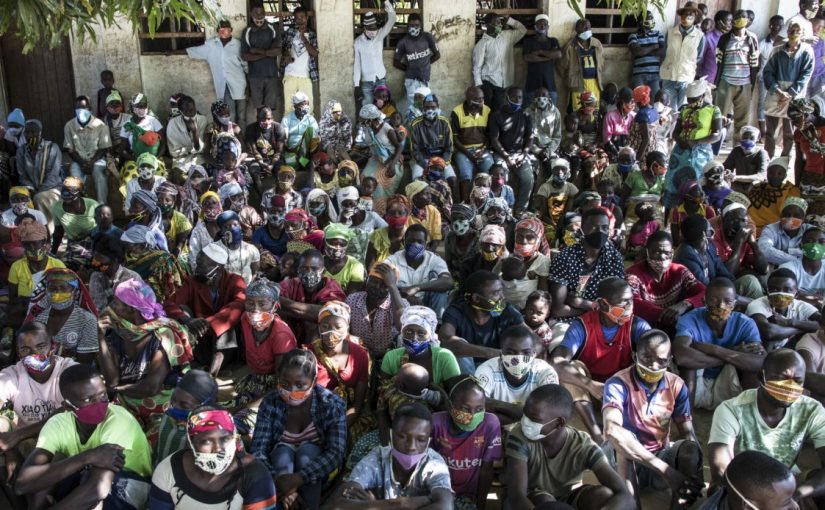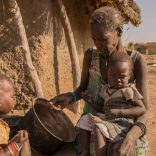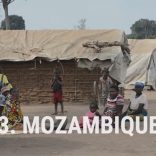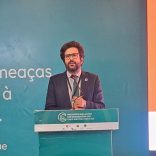Mozambique: UEM only graduates a third of students admitted each year
Mozambique: Covid-19 calls for social distancing impossible among those fleeing – Watch

Photo: Ricardo Franco/Lusa
In a camp in Metuge housing more than 10,000 people displaced by armed violence in Cabo Delgado, it is virtually impossible to follow the preventative rules regarding the new coronavirus.
Among hundreds of tents in Metuge, Mustafá Ali Azito makes marks with spray paint on the dirt floor.
These indicate the minimum distance that the displaced people must keep between themselves in the queue to receive donations of blankets and mats. The enclosure is even delimited with a rope, all to prevent the Covid-19.
But the irony is evident: around this, hundreds of people are literally jostling each other to see what is happening and to get a place in the queue, many without a mask.
“It is not at the first warning that they follow the recommendations. Some even think that this is not something that affects them,” says Mustafá, a member of the non-governmental organization Ayuda en Acción, which manages five accommodation areas in Metuge, Cabo Delgado.
About 10,000 people are refugees there, with large families of five to 10 people sharing tents.
“We, as organisations that work with them, always advise them and try to make it clear what social distancing is,” he emphasises.
So distribution takes place strictly following the marks on the floor, each one washing their hands before passing into the rope-delimited area, but outside, the only sign of Covid-19 prevention in the whole camp is the masks that some of the displaced wear.
The bishop of Pemba, Luiz Fernando Lisboa, regularly visits the accommodation areas and says that there is no way to guarantee social distancing in the camps.
“Everyone is together. Children play together all the time. There is no way,” he says. “Unfortunately, Covid-19 takes a back seat” in Cabo Delgado. “I don’t say that with any pleasure. It is sad, because it only made the situation worse,” at a time when the province most needed support.
If on the one hand it seems that there is no way to prevent it, on the other it can be a matter of insistence.
“It is not impossible” to comply with the measures in these camps, says Daniel Timme, head of communication for the United Nations Children’s Fund (UNICEF), “but it is an educational process”.
“We are running campaigns” to disseminate information, he highlights, in what he calls an ongoing challenge.
But the pandemic has another side, he adds: it also affects humanitarian work. The fight against nutrition, for example, which affects about half the population.
“Usually, what we do in areas like this is to establish health centres for observation,” but this is not possible now, he says, because of the crowding, and the work is left to mobile teams outside the camps.
There are also fewer opportunities overall to mobilise human and material resources for the emergency in Cabo Delgado, he acknowledges.
Displaced Célia Aiuba wears a mask as she collects water in the 03 de Fevereiro camp in Metuge. Two bowls for cooking, washing and personal hygiene, she explains. Besides her is Tima Ali, smiling as he carries his buckets, and laughing when asked where his mask is.
Two taps emerge from the ground, surrounded by colourful bowls and buckets, with several women waiting their turn.
“We had to create conditions for people to have drinking water, sanitation facilities and conduct community education to improve hygiene habits, considering Covid-19,” Samuel, who is responsible for water and sanitation at UNICEF, says.
The United Nations agency installed several kilometres of pipework from the main supply network in Pemba, the provincial capital, to the camps.
The taps guarantee water 24 hours a day, in an area which, even before Ccovid-19, “was already considered at risk for diseases related to inappropriate water supply”. “Hence the importance of guaranteeing drinking water in this area,” Manhiça explains. And there is no excuse for not washing hands.
As for wearing a mask and social distancing, the mission seems impossible, but humanitarian organisations continue to insist on the recommendations, hoping that at least some will follow the rules.
By Luis Fonseca













Leave a Reply
Be the First to Comment!
You must be logged in to post a comment.
You must be logged in to post a comment.